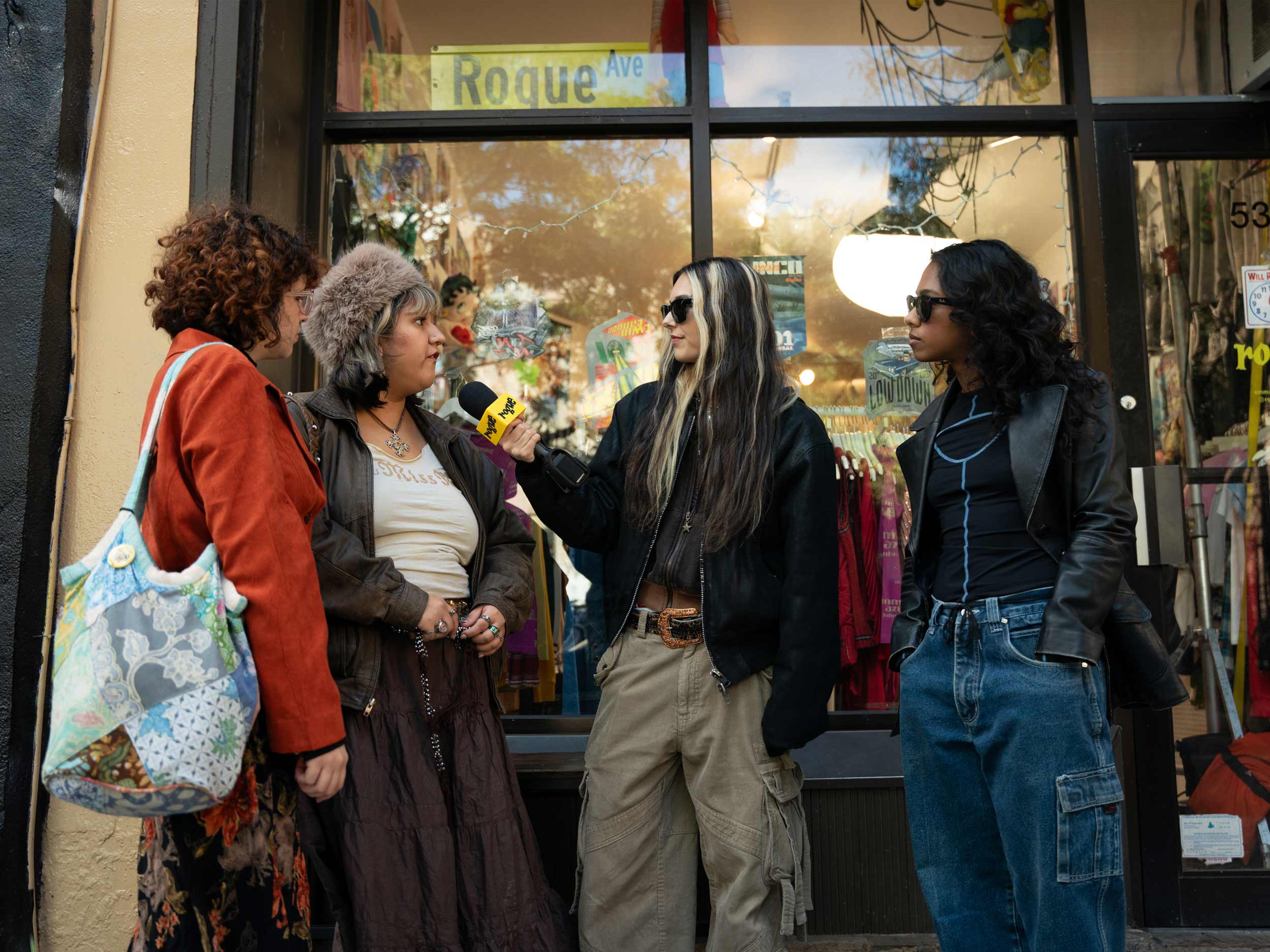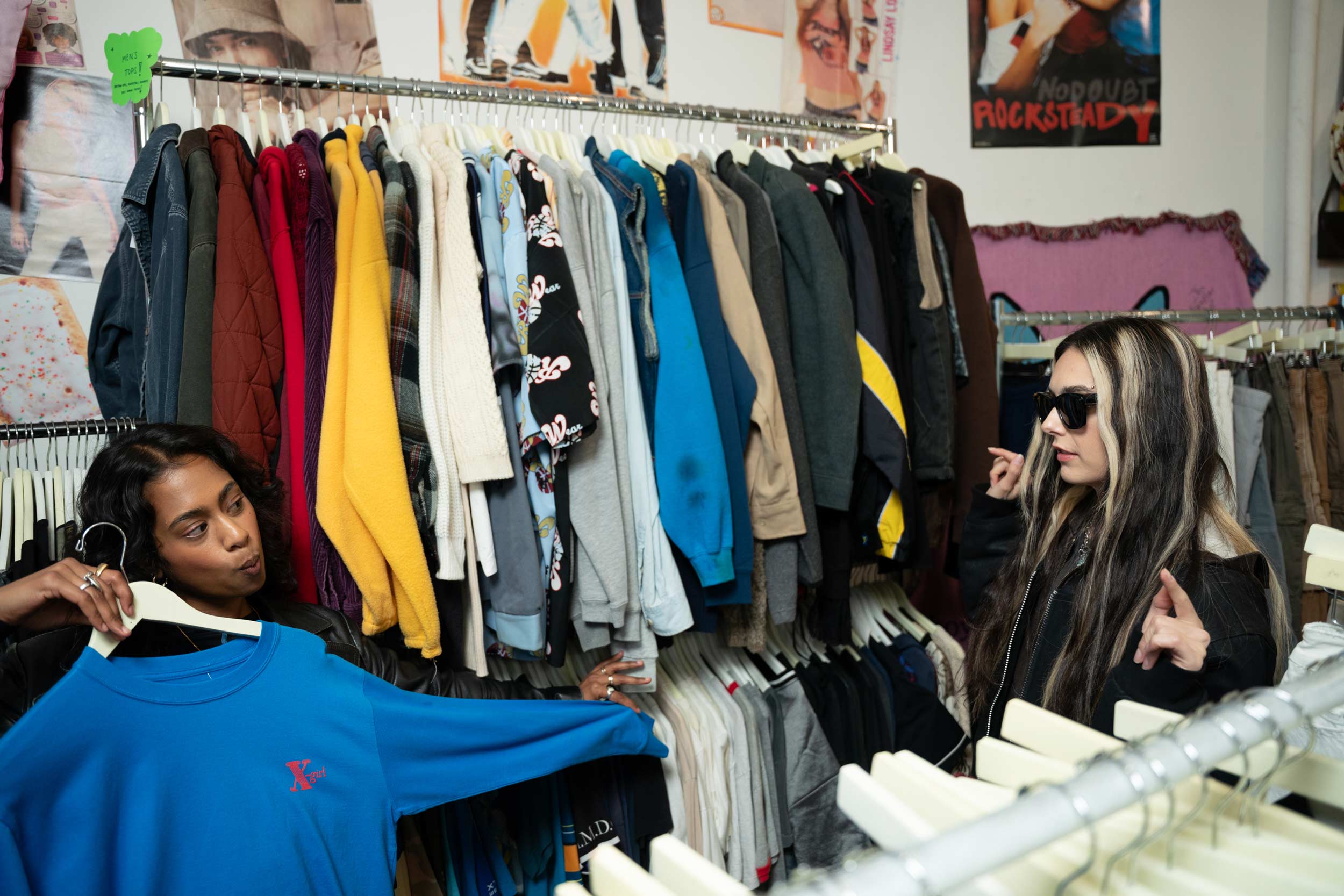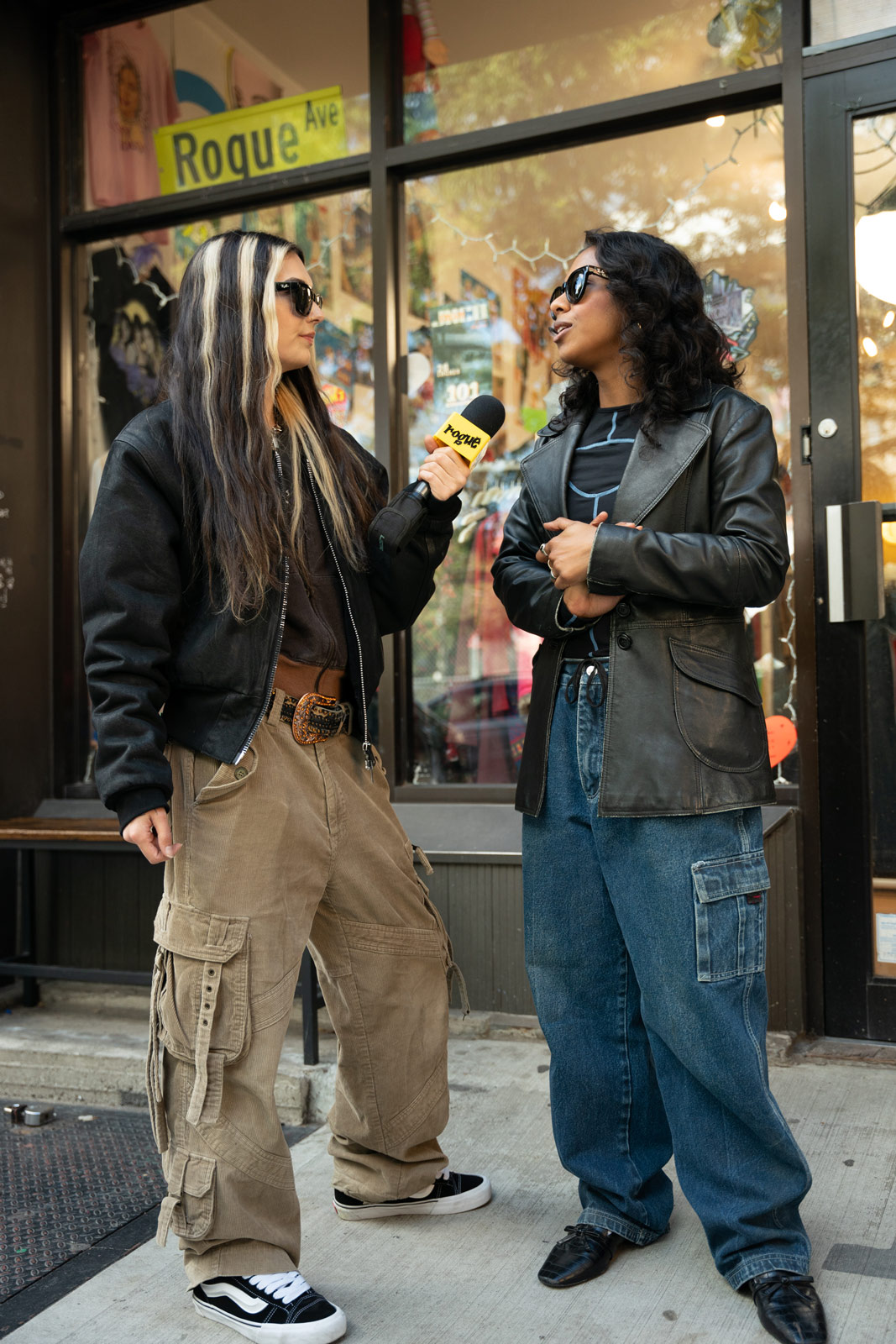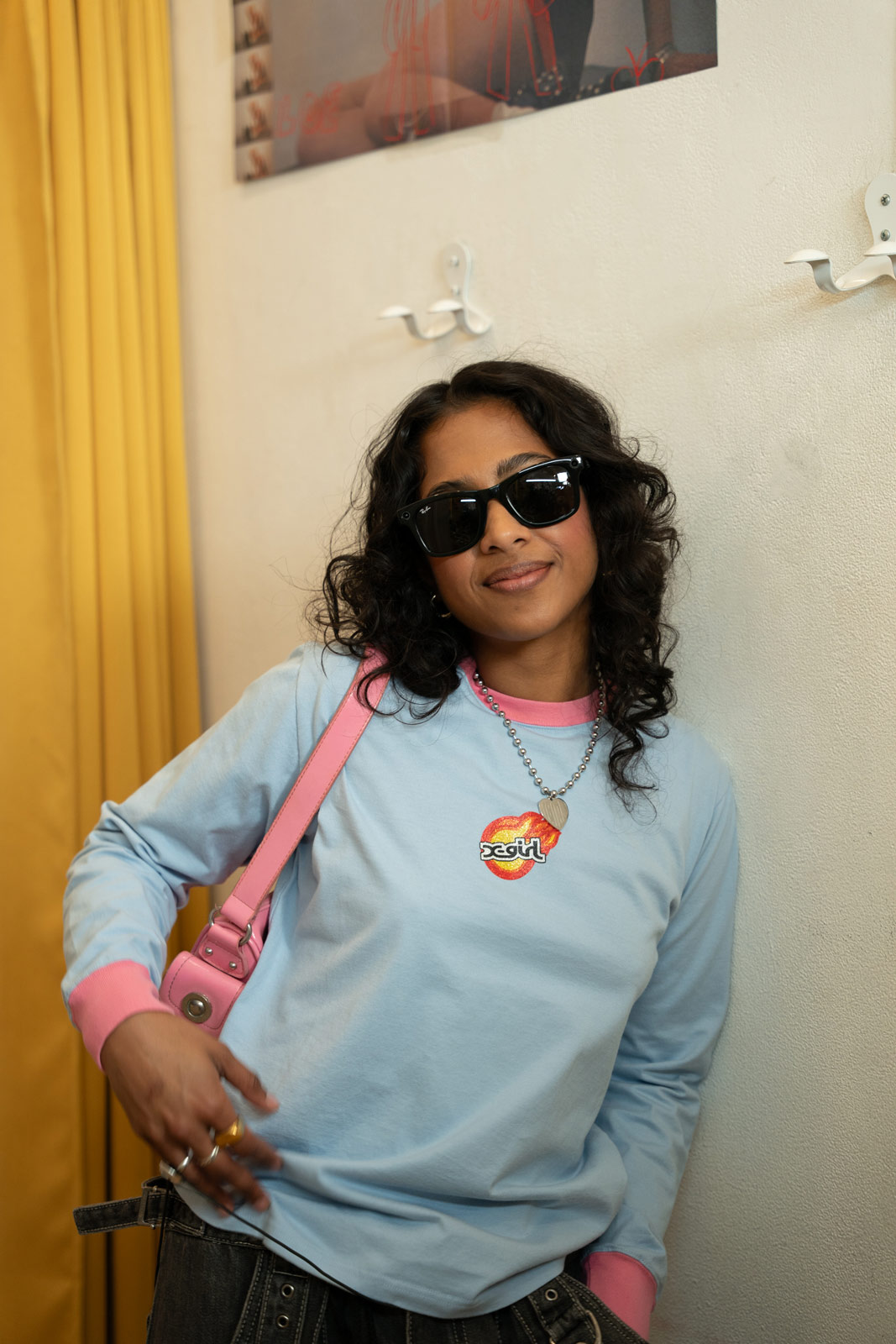The vintage maverick speaks on what it took to build her brand—from Depop, to brick and mortar, to a future in the Metaverse
In the last few years, Emma Rogue has paved her own path through New York’s retail landscape, earning her keep as the so-called Downtown Darling of Vintage Fashion. What started as a buzzy Depop page eventually made it to Instagram, and then to the Bowery, with a brick and mortar thrift shop turning heads across the street style scene.
Rogue the boutique was born from social media, and it could have easily stayed there—the young founder is something of a short-form content guru, producing clip after viral clip until she’d amassed an audience in the hundreds of thousands. But on the weekends, it was all about being on the ground, face to face with vintage-heads eager to feel out her pieces in person. “I was selling every weekend at street fairs in New York City—Hester Street Fair, Grand Bazaar, other pop-ups around Manhattan,” Rogue tells Document. “2021 came around and three of my colleagues opened shops, because the rents were so low. I was like, It’s my turn. Two and a half years later, we’re here.”
The online presence, Rogue clarifies, was not a means to an end. To this day, the digital and the physical go hand in hand, allowing for a global community of enthusiasts who might stop by to shop when in New York, and peruse from a distance otherwise. “It just opens up so much more,” she says, speaking to her dual approach. This sort of flexibility might be a model for the future of retail, where the shifting tides of real estate and funding play less of a part in the viability of a creative business.
At the moment, Rogue heads Meta’s It’s Your World campaign, advocating for the full harnessing of new technology for the next generation’s hyper-specific needs. The Ray-Ban Meta Smart Glasses—a new addition to the company’s AI offerings, enabling POV livestreams—could have come in handy as she produced ASMR Reels, packing early Rogue orders. Today, she might hand them to her cashiers: “We could go live from the shop and stream to our customers who aren’t able to physically come, because they’re located in Germany or India or LA.”
Here, the streetwear maverick speaks to the connective tissue between the online and the real world, weaving through Y2K, ThriftCon, and Rogue muses in the process.
Morgan Becker: Tell me about how Rogue came to be. How far back does your love of clothes go?
Emma Rogue: I began thrifting early early on; I would say around the third grade. My mom would take me Thursdays, after gymnastics practice. But it wasn’t until college that I began reselling. One day it just hit me—I decided to list an item on Depop and it sold within an hour. I was like, Oh, I have something here, so I ran with it. Eventually, Depop hired me and I was manning their Soho location in New York. But that was short-lived: The pandemic came and they closed down the shop. I was like, I really want to focus on my shop.
That’s when everything kind of snowballed, because everyone was online during the pandemic. My business grew really well. I started making short-form content, long-form content, posting on Instagram, making sales through Instagram. 2021 came around and three of my colleagues opened shops, because the rents were so low. I was like, It’s my turn. Two and a half years later, we’re here.
Morgan: Why’d you go brick and mortar if you were successful online?
Emma: While I was on Depop, I was selling every weekend at street fairs in New York City—Hester Street Fair, Grand Bazaar, other pop-ups around Manhattan. And I would do really well. I knew how to curate. I knew who my customer was. That IRL connection is something you can’t get online, right? Like, seeing the customer buy a certain piece, seeing them fall in love with that item… Maybe you do a bit of negotiating, a bit of back and forth, and [in the process] you learn about them and their story. I really wanted to have a standalone shop where I could make moments like that happen every day.
I knew it would be successful. I would do these ASMR videos—me packaging the orders—and they would go viral. All these videos, like me going sourcing, flying out to ThriftCon, going to a rag house… I just knew the attention I was getting would [make the store] successful. I couldn’t let that moment go to waste.
Morgan: Where do those skills come from, in terms of communicating via social media?
Emma: I don’t know. Maybe I was born with it. I think I’m a very outgoing, extroverted person. And I love learning about and talking to everyone, even if they don’t find anything [at Rogue]. I think that translates when it comes to telling stories through video. Growing up, I taught myself Photoshop and Premiere, so I’ve been making videos for a long time—mind you, back then they weren’t that good. I wanted to be a whole prank YouTuber. But that didn’t work [laughs]. I’m very humble, but I have a good eye, and I know what hits by now—what will make a viral video. All of those things combined is a good recipe to cultivate a community in my niche.
Morgan: Would you tell me a bit about how you handle sourcing?
Emma: A lot of it is online. When I first started selling on Depop, I would go to markets and stuff, and I would get people’s Instagrams. Sellers post on their story when they have new loads coming in; these would be [vintage] pickers that buy out neglected storage units or go to rag houses—just in places that I’m not. They might hit me up because they know I like Y2K, like, Hey, I have a hundred Rocawear belts, blinged-out. And I was like, That’s me. We’d negotiate and I would buy them. You can find crazy stuff on Facebook Marketplace. If you just start messaging people, they’ll lead you to another person, [then another]. And then flea markets, estate sales; I go traveling all over the world finding stuff.
Morgan: Tell me about this campaign. What does It’s Your World mean to you?
Emma: In 2018, another reseller was like, Oh my god, Emma, you have to make an Instagram page. You can’t just be on Depop, you get people buying through Instagram. I remember the day I started [the account], and now it’s at almost 250,000 followers. Without the tools of Instagram and Facebook Marketplace, Rogue wouldn’t be where it is today; I need those connections. With the introduction of Reels, and Collab posts, it’s really boosted business in a way I can’t comprehend sometimes. I’m really excited for the Meta Smart Glasses—thinking back to those ASMR videos I did, it was just not easy to film. But now, we can go live from the shop and stream to our customers who aren’t able to physically come, because they’re located in Germany or India or LA. It just opens up so much more.
Morgan: It’s kind of a way to bridge the physical space with your online audience.
Emma: The social media aspect of my business really changed the trajectory. And it’s tough, because I’m not a corporate business. Like, it’s literally just me and a very small team of kids who just graduated, kids in college. Social media stuff was picking up heavy, so we did focus on that. Now we’re running it back and focusing on the brand, because [that’s what] will sustain the brick and mortar.
Morgan: Why New York?
Emma: I mean, I think New York City is the cultural hub of the United States. People from all different walks of life are here. People in New York are just open-minded. They’re also the most fashion-forward.
Morgan: Any muses who are at the center of the Rogue vision?
Emma: I’m super inspired by my childhood—anything that takes me back to when I was a kid. If we’re talking currently, I mean, Paris Hilton is coming to mind right now. Virgil Abloh, who’s an amazing inspiration, [showing you can] work your way up and be one of the most impactful designers of your generation. Kid Super. Claudia Schiffer—I recently met her. An iconic model of the ’90s, discovered randomly at a bar. Even, like, Donatella Versace, taking over her brother’s company and growing it to what it is today.
Morgan: What do you see in Rogue’s future?
Emma: Number one, the Rogue clothing line. We’re super excited for that—I’m getting more samples next week. And then just continuing to build the Rogue universe, focusing more on artists. Maybe Rogue Records will come down the line. And I know the world is heading here: I want Rogue to exist in the metaverse. While I would love to open other physical locations in London, Tokyo, Miami, whatever, people who still don’t have access to Rogue IRL would be able to [attend virtual] in-store activations. And yeah, just continuing to create more content that inspires the youth. Not even just the youth—everyone.













